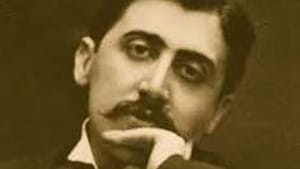Stay in the Loop
BSR publishes on a weekly schedule, with an email newsletter every Wednesday and Thursday morning. There’s no paywall, and subscribing is always free.
… And he wrote poetry, too!
Marcel Proust, poet

It probably shouldn't come as a shock that Marcel Proust set his hand to writing verse, but I admit that I was surprised to encounter this title. There are 104 poems in all here, and most are fairly brief; the longest runs about 90 lines.
As you might expect, the young Proust wasn't wholly able to escape the influence of the Symbolist Movement, which believed that art should represent absolute truths that could only be described indirectly. To be sure, Proust later crossed literary swords with the movement's leader, Stephane Mallarmé, over what Proust termed "obscurity" in Symbolist verse.
His own early pieces in the Symbolist vein can hardly be termed clear, but they're not without felicitous passages, as in these lines from I Often Contemplate My Memory's Skies:
"Time erases the closeness of evening
My hands on her neck as virgin as snow
Her gazes down my nerves in an arpeggio
As over us spring sets its censers swinging…."
Proust's series of poems about great artists of the past— originally published as part of the volume Pleasures and Days but never before translated into English— are pleasant but unremarkable. Writing poems in praise of deceased greats in literature, art and music was something of a cottage industry among late 19th- and early 20th-Century poets. Proust's contributions are no better or worse than the others.
Not surprisingly, Proust comes into his own in the writing of vers de societé: occasional pieces celebrating friendships, casual acquaintances and life's little moments, usually in a gently humorous manner. Proust had his moments of biting wit, but even his out-and-out attempts at satire, as in his take-off of a scene from Maurice Maeterlinck's famous drama, Pelléas et Mélisande, could hardly be termed bare-knuckled.
In the end, Proust turns out to be a far more humorous fellow than his multi-part masterpiece would lead one to assume. But I must admit that one of my favorite pieces is this relatively trifling piece, On Rainy Weather:
"Perhaps you love, much less than me, these storms.
Could be. The mind will vary in its forms."
As you might expect, the young Proust wasn't wholly able to escape the influence of the Symbolist Movement, which believed that art should represent absolute truths that could only be described indirectly. To be sure, Proust later crossed literary swords with the movement's leader, Stephane Mallarmé, over what Proust termed "obscurity" in Symbolist verse.
His own early pieces in the Symbolist vein can hardly be termed clear, but they're not without felicitous passages, as in these lines from I Often Contemplate My Memory's Skies:
"Time erases the closeness of evening
My hands on her neck as virgin as snow
Her gazes down my nerves in an arpeggio
As over us spring sets its censers swinging…."
Proust's series of poems about great artists of the past— originally published as part of the volume Pleasures and Days but never before translated into English— are pleasant but unremarkable. Writing poems in praise of deceased greats in literature, art and music was something of a cottage industry among late 19th- and early 20th-Century poets. Proust's contributions are no better or worse than the others.
Not surprisingly, Proust comes into his own in the writing of vers de societé: occasional pieces celebrating friendships, casual acquaintances and life's little moments, usually in a gently humorous manner. Proust had his moments of biting wit, but even his out-and-out attempts at satire, as in his take-off of a scene from Maurice Maeterlinck's famous drama, Pelléas et Mélisande, could hardly be termed bare-knuckled.
In the end, Proust turns out to be a far more humorous fellow than his multi-part masterpiece would lead one to assume. But I must admit that one of my favorite pieces is this relatively trifling piece, On Rainy Weather:
"Perhaps you love, much less than me, these storms.
Could be. The mind will vary in its forms."
What, When, Where
Marcel Proust: The Collected Poems. Introduction and notes by Harold Augenbraum (various translators). Penguin, 2013. 352 pages, $25. www.us.penguingroup.coml.
Sign up for our newsletter
All of the week's new articles, all in one place. Sign up for the free weekly BSR newsletters, and don't miss a conversation.
